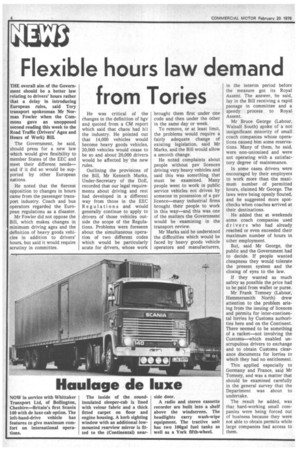Flexible hours law demand from Tories
Page 6

If you've noticed an error in this article please click here to report it so we can fix it.
THE overall aim of the Government should be a better law relating to drivers' hours rather that a delay in introducing European rules, said Tory transport spokesman Mr Norman Fowler when the Commons gave an unopposed second reading this week to the Road Traffic (Drivers' Ages and Hours of Work) Bill.
The Government, he said, should press for a new law which would give flexibility to member States of the EEC and meet their different needs— and if it did so would be supported by other European nations.
He noted that the fiercest opposition to changes in hours came from the passenger transport industry. Coach and bus operators regarded the European regulations as a disaster.
Mr Fowler did not oppose the Bill, which makes changes in minimum driving ages and the definition of heavy goods vehicles in addition to drivers' hours, but said it would require scrutiny in committee. He was critical of the changes in the definition of hgv and quoted from a CM report which said that chaos had hit the industry. He pointed out that 14,000 vehicles would become heavy goods vehicles, 20,000 vehicles would cease to be so and about 20,000 drivers would be affected by the new rules.
Outlining the provisions of the Bill, Mr Kenneth Marks, Under-Secretary of the DoE, recorded that our legal requirements about driving and rest had developed in a different way from those in the EEC Regulations and would generally continue to apply to drivers of those vehicles outside the scope of the Regulations. Problems were foreseen about the simultaneous operation of two different codes which would be particularly acute for drivers, whose work brought them first under one code and 'then under the other in the same day or week.
To remove, or at least limit, the problems would require a fairly adequate change of existing legislation, said Mr Marks, and the Bill would allow a smooth change.
He noted complaints about people without psv licences driving very heavy vehicles and said this was something that must be examined. Many people went to work in public service vehicles not driven by someone in possession of a pay licence—many industrial firms brought their people to work in this way—and this was one of the matters the Government would be examining in the transport review.
Mr Marks said he understood the difficulties which would be faced by heavy goods vehicle operators and manufacturers, in the interim period before the measure got its Royal Assent. The answer, he said, lay in the Bill receiving a rapid passage in committee and a speedy process to Royal Assent.
Mr Bruce George (Labour, Walsall South) spoke of a not insignificant minority of small ccach companies whose operations caused him some reservations. Many of them, he said, were non-unionised and were not operating with a satisfactory degree of maintenance.
In some cases drivers were encouraged by their employers to work more than the maximum number of permitted hours, claimed Mr George. The laws were being openly flouted, and he suggested more spotchecks when coaches arrived at their destinations.
He added that at weekends some coach companies used drivers who had already reached or even exceeded their maximum number of hours in other employment.
But, said• Mr George, the public and the Government had to decide. If people wanted cheapness they would tolerate the present system and the closing of eyes to the law.
If they wanted as much safety as possible the price had to be paid from wallet or purse.
Mr Frank Tomney (Labour, Hammersmith North) drew attention to the problem arising from the issuing of licences and permits for inter-continental lorries by Customs authorities here and on the Continent. There seemed to be something of a racket—not involving the Customs—which enabled unscrupulous drivers to exchange and to obtain Customs clearance documents for lorries to which they had no entitlement.
This applied especially to Germany and France, said Mr Tomney, and was a matter that should be examined carefully in the general survey that the Department was about to undertake.
The result he added, was that hard-working small companies were being forced out of business because they were not able to obtain permits while large companies had access to them.
















































































































